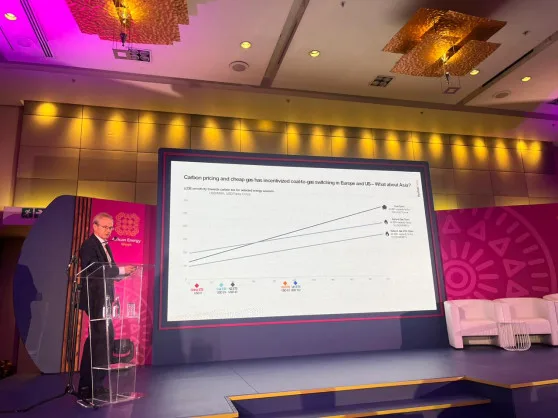
During the Technical Track on Monday ahead of the African Energy Week (AEW) (https://AECWeek.com) 2023 conference – taking place in Cape Town from October 16-20 – independent energy research and business intelligence company Rystad Energy, the event’s official knowledge partner, delivered a compelling presentation on the global Liquefied Natural Gas (LNG) landscape. Spearheaded by Per Magnus Nysveen, Senior Partner and Chief Analyst at Rystad Energy, the presentation, framed under the theme, A Long-Term Outlook for Global LNG in a World of Energy Transition, set the stage for a series of technical discussions to be held throughout the event.
Nysveen commenced the presentation with a pivotal question: “Is energy transition a break or a good opportunity for the gas market?” This question became the cornerstone for a comprehensive exploration of the evolving role of LNG in the current energy transition. Nysveen highlighted the significance of addressing energy consumption and emissions from gas, emphasizing the growing importance of renewable energy sources. He noted, “Gas demand will continue to grow in various emission scenarios, but achieving significant emissions reductions will necessitate substantial investments in renewables.”
The presentation delved into the multifaceted role of gas, comparing its applications to other fossil fuels like oil and coal. Nysveen pointed out that while gas excels in direct use for purposes such as heating and cooking, it presents challenges in the realm of power generation. However, Nysveen stressed that coal’s environmental concerns, owing to its carbon-intensive operations, had led to a decline in its presence in the global power mix. This decline enhanced the competitiveness of natural gas, making it a more attractive option.
Cost dynamics of different energy sources were explored, with Nysveen underlining that the Levelized Cost of Electricity for new renewable power projects favorably compared to that of natural gas. “Solar and hydropower, priced at an average of $36 and $42 per MWh hour, respectively, stand out in contrast to natural gas’s average of $100 per MWh,” noted Nysveen. “However, the competitive edge of natural gas stemmed from its lower investment costs, especially when compared to capital-intensive renewable projects typically financed through loans.”
The presentation also addressed the importance of a balanced power system and emphasized the role of gas as a complement to renewable energy sources. Nysveen highlighted the significance of gas’s flexibility and reliability in stabilizing power systems. His outlook for the future included a forecast that renewables would increasingly dominate the global power mix by 2040, initially replacing coal and later challenging gas.
The presentation emphasized the growing demand for LNG and its potential for significant growth in Africa. Nysveen pointed out that while current LNG demand exceeded supply, meeting this demand in the long-term would require higher-cost projects, leaving room for Africa to make its mark on the industry.
“Personally, I believe that the need for energy and population growth in Africa points to significant potential for the development of future gas projects on the continent.”
The presentation kicked off the Technical Track at AEW 2023, where discussions on gas and project rollout will be further explored, with a host of regional energy professionals, global investors, and representatives from both the public and private sectors converging in Cape Town to facilitate dialogue, network, and solidify deals.
Distributed by APO Group on behalf of African Energy Week (AEW).

